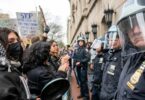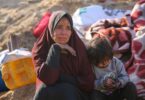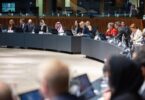Geoff Porter
The pandemic has exacerbated persistent structural problems in the government’s approach to foreign investment, banking reform, monetary policy, and other sectors, but Algiers may be more open to U.S. advice on such matters.
Algeria’s planned June 12 election will result in a new prime minister and a cabinet full of new ministers, but regardless of who wins office, their most urgent priority will be an economy reeling from the coronavirus pandemic and preexisting structural problems. Fortunately, these circumstances offer the United States a unique opportunity to build broader economic ties with the fiercely independent country, perhaps allowing for additional channels of cooperation in other domains.
Structural Challenges Exacerbated by the Pandemic
At the heart of Algeria’s economic challenges is its reliance on hydrocarbon exports, which account for 30% of its GDP. The pandemic-induced decline in natural gas and oil prices dropped the country’s hydrocarbon revenues by 33%, from $33 billion in 2019 down to $22 billion last year. Although its gas sales have rebounded somewhat in 2021, its gas exports are typically seasonal, so the improved first-quarter numbers are unlikely to be sustainable throughout the remainder of the year.
Similarly, the foreign remittances that account for roughly 1% of GDP dried up in 2020 as lockdowns were implemented across Europe. Algeria’s own lockdowns imposed burdensome curfews and curtailed public life, effectively freezing the all-important informal economy (roughly 33% of GDP). The government embraced lockouts as well: after an initial period of limited repatriation flights, it closed the land, sea, and air borders so tightly that almost no one could get in or out (limited air travel with France is expected to reopen on June 1).
Although such restrictions reportedly kept COVID-19 from spiraling out of control, they also had a host of unintended ill effects on the populace. Shortages are now being reported for staples such as cooking oil and pasta; social media is rife with videos of Algerians queueing for food, a phenomenon that has not been seen in fifty years. Supply chain disruptions have drastically raised the prices of other foods as well; items like chicken, shrimp, potatoes, tomatoes, and sardines are now prohibitively expensive for the average citizen. Car prices are skyrocketing too—Algeria suspended its problematic automotive assembly sector around the same time that vehicle imports were halted in order to lessen the current account deficit, forcing many people to buy overpriced used cars.
The Government’s Response
Thus far, officials have sought gradual devaluation of the Algerian dinar as a way of stimulating exports and encouraging demand for locally made products, since state-owned industries still manufacture everything from mayonnaise to paint and air conditioners. Yet this policy has only encouraged citizens to exchange their dinars for other currency on the black market.
Partly as a result of this practice, as much as 35% of dinars never pass through the banking system, leaving the state with a deep liquidity crisis. Pensioners often line up early in the morning and scramble to collect their monthly allowances before the cash runs out. State-owned enterprises have stopped paying salaries in order to conserve cash, while state banks have imposed a moratorium on further lending. To address the liquidity problem, President Abdelmadjid Tebboune has suggested a return to printing money, but that would only add to the inflationary pressures resulting from dinar devaluation.
Political Dissatisfaction Persists
Although many Algerians are increasingly frustrated that their economic wellbeing is in jeopardy, the country’s ongoing Hirak protest movement does not have any demands specifically related to economic conditions—rather, its grievances are with the political leadership and the political system. After two years and 119 Friday marches (which have resumed after a brief COVID-induced hiatus), the movement continues to demand that the entire political class be replaced, that the military cease interfering in politics, and that a wholly civilian state be established.
Critics have consistently argued that this message is too absolutist and devoid of actionable policy positions, and the same can be said of Hirak’s approach to economic issues. The movement seems to believe that if the political system were entirely overhauled, the economy would gradually correct itself. In any case, turnout for Hirak marches has decreased considerably since 2019, as has the government’s patience with the movement. Security services are arresting more demonstrators each week, often accusing them of “undermining national unity.”
Whatever the movement’s fate, however, the fact remains that even if the pandemic ended tomorrow and oil/gas prices rose immediately, Algeria’s economy would still be hamstrung by structural problems and basic infrastructure deficits. The state offers housing to citizens, but availability is tight, and many families languish on waiting lists for years. Access to potable water is also returning to the fore, with water cuts reimposed at the beginning of May in Algiers and other locations. All of these deficits are accentuated in the south, where housing, water, healthcare, and basic foodstuffs are in shorter supply than in the north.
Opportunities for U.S. Engagement
One silver lining to Algeria’s economic problems is that they give U.S. officials a way to engage the country without trespassing on its domestic political developments or national sovereignty. Since 2012, the primary forum for fostering bilateral relations has been the U.S.-Algeria Strategic Dialogue. These discussions are typically dominated by security considerations, with Washington lauding Algeria’s counterterrorism successes while urging the country to help safeguard stability in North Africa and the Sahel.
By moving beyond this framework, the dialogue could start building economic bridges. Instead of viewing Algeria predominantly through the lens of security cooperation and oil/gas exploitation, the United States should promote programs that benefit broader swaths of the population, relieve some of their economic stresses, and serve as a stepping-stone to greater engagement in other domains. Algeria is Africa’s largest country and home to 45 million people, so any instability there would ricochet south to the Sahel and north to the Mediterranean and Europe.
One promising window for U.S. engagement is investment. Last year, Algeria ended its prohibitive 51/49 ownership rule for all but five strategic sectors. This rule stipulated that foreign companies could only own minority stakes in Algerian companies, which discouraged Western firms from investing in energy and other sectors. The government has been discussing whether current economic circumstances merit opening even those five remaining sectors to foreign direct investment, which could pave the way for a flood of FDI into Algeria. A handful of U.S. companies are already active there—Citibank, Coca-Cola, Dow Chemical, GE, Honeywell, Merck, Occidental Petroleum, Pfizer—and the end of the 51/49 rule creates abundant opportunities to increase U.S. FDI. This could in turn create more jobs for Algerians, spur technology transfers, and impart best practices to the broader Algerian business community. The United States will be the “Guest of Honor” at next month’s Algiers International Fair, giving American companies a prime setting to showcase how their activities can help Algeria.
In addition to boosting FDI, Algiers could benefit from guidance on reforming the banking sector, improving its monetary policy, establishing e-payment platforms, and harnessing the power of the informal economy to increase tax receipts. All of these are well within Washington’s capabilities.
Given its past experiences with the IMF, Algeria has been reluctant to turn to international financial institutions for economic relief. The last time it faced a similar economic crisis in the 1980s, it sought IMF assistance but then blamed the organization’s mandatory structural reforms for the country’s ensuing instability. As a result, it may be more amenable to discreet bilateral offers of assistance from Washington instead of the more politically toxic international financial institutions.
Indeed, Washington is better positioned than most any other foreign partner. Algeria is cautious about promoting further investment from France because of its colonial history. It is also wary of Chinese investment, which tends to rely on imported materials and labor rather than contributing to Algeria’s “projet national.” And although Russia remains the primary source for Algerian military equipment, the current political leadership does not have the same level of interaction with Moscow that previous Algerian leaders had during the Cold War.
In pursuing these opportunities, Washington must be careful to frame offers of assistance in a politically sensitive way. Algeria rightfully bristles at suggestions that U.S. and European officials view it primarily through the lens of immigration of radicalization threats. Thus, the Biden administration should extend advice and guidance to Algeria simply for Algeria’s sake—noting that the bilateral relationship will be strengthened as a natural byproduct of that effort. There is no guarantee that Algiers will take Washington’s counsel, but trying is the only way to find out.
Geoff Porter is president of North Africa Risk Consulting, a firm specializing in political and security risks in the region’s hydrocarbons sector.






